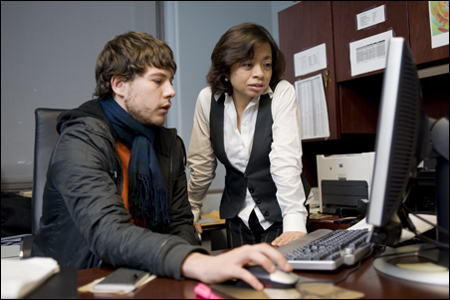
Sheila Coronel is director of the Toni Stabile Center for Investigative Journalism at Columbia University’s Graduate School of Journalism. Photo by Casey Kelbaugh/Courtesy of Columbia University Graduate School of Journalism.
The forces that shape the lives of ordinary Americans increasingly know no national boundaries. The flow of goods and money, the spread of corruption and disease, rising sea levels and the abuse of computer networks—those are all global stories now.
For Sheila S. Coronel, director of the Toni Stabile Center for Investigative Journalism at Columbia University’s Graduate School of Journalism, that means a whole new world of opportunities.
Most news organizations are facing serious resource constraints these days, of course. So Coronel advocates for watchdog reporting that takes advantage of technology and the new willingness to collaborate with other media organizations—in this case, media organizations from other countries.
The ability to pursue globe-spanning projects through collaboration is part of the changing landscape of global investigative journalism that Coronel, who was a pioneering investigative reporter in her native Philippines before coming to Columbia, chronicles in her “WatchDog Watcher” blog.
The ultimate goal, she told Nieman Reports in a recent interview, is exposing wrongdoing that previously may have been out of the reach of most journalists.
“You’re talking about holding organizations that have a global reach accountable so this can be multinational companies; it can also be FIFA [the governing body of international soccer]; it can be the Catholic Church or the Scientology church; it can be nonprofits that operate globally,” she said.
The global watchdog stories that are probably the most familiar to American readers are those about outsourcing by U.S.-based multinational companies. One of the most recent examples was The New York Times’s extraordinary examination of the working conditions at Chinese factories making Apple products.
“It’s just the reality of the global market that most of our beloved gadgets are made elsewhere,” Coronel said.
But such reporting is not beyond the abilities of reporters at smaller news organizations, Coronel insisted. “You can collaborate now with organizations around the world,” she said.
Any news organization with a Wal-Mart in its backyard could, for instance, try to follow the supply chain back to China by working with Chinese journalists, Coronel said. She recommended getting in touch with reporters at Caixin, a muckraking Chinese financial magazine.
What American companies do overseas, including how they hide their profits, is fertile ground for watchdog reporting, Coronel said. But so is how foreign companies and individuals use the U.S.’s lax rules about corporate disclosure to hoard their money here. “The U.S. is the biggest destination of illicit financial flows from around the world,” she noted.
Other areas rich with potential for global collaboration include cyberespionage and cybersecurity, drug trafficking, human trafficking, product safety, and climate change.
Coronel said she’s particularly excited about the growing number of nonprofit investigative groups that are turning their attention to cross-border watchdog stories, and she is involved in a few of them.
A lot of experimentation is taking place at U.S.-based nonprofits, like the International Consortium of Investigative Journalists, a global network of reporters in more than 60 countries who collaborate on investigations. The ICIJ was founded in 1997 as a project of the Center for Public Integrity, on whose board Coronel formerly served.
Among its achievements: A series of stories on the multibillion-dollar business of tobacco smuggling, written by reporters in more than a dozen countries; and a series on the global black market in illegal fishing, which was a collaboration that included Le Monde (France), the International Herald Tribune, El Mundo (Spain), and Trouw (The Netherlands).
“There’s quite a lively growing group of nonprofits overseas as well,” Coronel said. One example is the Global Investigative Journalism Network, a consortium of nonprofit investigative journalism organizations with more than 70 member organizations in 35 countries.
One of the more specialized groups is the Organized Crime and Corruption Reporting Project, a consortium of regional nonprofit investigative centers and for-profit independent media in Eastern Europe and Central Asia. Coronel is a board member.
The project has spearheaded what it calls an Investigative Dashboard, which “shares detailed methodologies, resources, and links for journalists to track money, shareholders, and company ownership across international borders.”
Reporters these days can take advantage of new technologies including Skype and cloud-based collaborative spaces to overcome the traditional obstacles created by distance. But the next step for the Investigative Dashboard, for instance, is creating advanced, secure collaborative workspaces especially for reporters covering sensitive stories.
“I think you’re going to see a lot of stories on transnational organized crime, which is one of the big developments, which has not been covered enough,” said Coronel, noting that it’s also one of the areas best suited for collaboration. “You can distribute the costs—and the risks,” she said.
Overall, she said, although the structures and collaborative relationships involved in the new global investigative reporting may be different, some things remain the same. “Follow the money—globally,” she said. “It’s timeless advice, and it applies everywhere every time.”
Dan Froomkin writes about accountability journalism for Nieman Reports. He is senior Washington correspondent for The Huffington Post.

